Understanding Eid ul-Adha: The Festival of Sacrifice
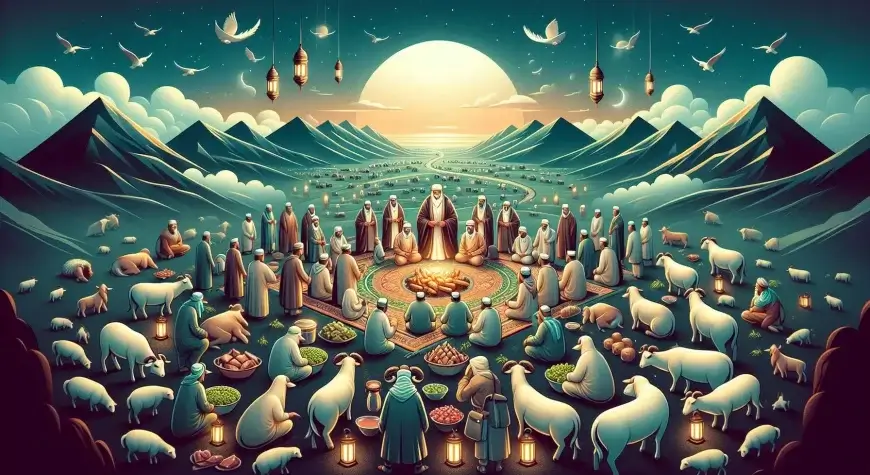
Eid ul-Adha, also known as the Festival of Sacrifice, is one of the most significant holidays in the Islamic calendar. Celebrated by millions of Muslims worldwide, this festival is a time for reflection, devotion, and communal harmony. It commemorates the willingness of Prophet Ibrahim (AS) to sacrifice his son in obedience to Allah’s command, highlighting themes of faith, sacrifice, and gratitude. In this comprehensive blog, we’ll explore the history, significance, rituals, and contemporary relevance of Eid ul-Adha, providing a rich understanding of this important Islamic celebration.
The Second Most Important Islamic Holiday
Eid ul-Adha is the second of two major Islamic holidays, the first being Eid ul-Fitr. While Eid ul-Fitr marks the end of Ramadan, a month of fasting and spiritual reflection, Eid ul-Adha occurs during the Islamic month of Dhul-Hijjah. It coincides with the culmination of the Hajj pilgrimage, a journey of spiritual renewal and purification that every Muslim is expected to undertake at least once in their lifetime, if physically and financially able.
This holiday is especially important because it not only marks the end of Hajj but also serves as a powerful reminder of the virtues of sacrifice, obedience, and faith that are central to Islam. The lessons of Eid ul-Adha extend beyond the individual to the entire Muslim community, fostering a sense of unity and collective worship.
A Celebration of Sacrifice and Devotion
At the heart of Eid ul-Adha lies the concept of sacrifice, which is commemorated through the act of Qurbani (animal sacrifice). This ritual honors Prophet Ibrahim’s (AS) devotion to Allah, illustrating his willingness to sacrifice his beloved son, Ismail (AS), as an act of submission to God’s will. Although Allah ultimately spared Ismail, substituting him with a ram, Ibrahim’s unwavering faith and readiness to obey divine command are celebrated and revered during this festival.

Eid ul-Adha is thus a powerful manifestation of a Muslim’s duty to submit to Allah’s will and trust in His wisdom, even when faced with seemingly insurmountable challenges. The festival’s rituals and traditions are designed to reinforce these values, encouraging Muslims to reflect on their own faith and the sacrifices they are willing to make in their spiritual journey.
The Story of Prophet Ibrahim (AS)
The story of Prophet Ibrahim (AS) is central to the celebration of Eid ul-Adha. According to Islamic tradition, Allah commanded Ibrahim to sacrifice his son Ismail as a test of his faith. Despite the immense emotional and psychological burden, Ibrahim prepared to fulfill Allah’s command. Just as he was about to carry out the sacrifice, Allah intervened, providing a ram to be sacrificed in Ismail’s place.
This profound act of faith and obedience is not only a cornerstone of Eid ul-Adha but also serves as a timeless example of submission to divine will. It teaches Muslims the importance of trust in Allah, the willingness to make personal sacrifices, and the belief that Allah’s wisdom surpasses human understanding. The story of Ibrahim and Ismail is recounted and reflected upon during Eid ul-Adha, reinforcing these spiritual lessons and their relevance in the lives of believers.
The Significance of Eid ul-Adha
Eid ul-Adha holds deep spiritual significance for Muslims around the world. It is a time to commemorate Ibrahim’s (AS) unwavering faith, to symbolize submission to Allah’s will, and to remind the community of the values of gratitude and generosity.
Commemorating Ibrahim’s (AS) Willingness to Sacrifice
The essence of Eid ul-Adha lies in commemorating the willingness of Prophet Ibrahim (AS) to sacrifice his son in obedience to Allah. This act of profound faith is a cornerstone of Islamic belief, illustrating the ultimate submission to God’s will. By remembering Ibrahim’s (AS) sacrifice, Muslims are reminded of the importance of their own faith and the need to prioritize their devotion to Allah above all else.
This commemoration is not merely a historical reflection but a call to embody the same level of faith and trust in Allah in daily life. It encourages believers to evaluate their own commitments and sacrifices, fostering a deeper spiritual connection and a more profound understanding of their faith.
Symbolism of Submission to Allah’s Will
Eid ul-Adha symbolizes the ultimate submission to Allah’s will. The willingness of Ibrahim (AS) to sacrifice his son at Allah’s command represents the epitome of obedience and faith. This act is a reminder to Muslims that true devotion requires complete trust in Allah, even when His commands may seem difficult or incomprehensible.
The festival encourages believers to reflect on their own lives and consider how they can better submit to Allah’s will. It serves as a reminder that faith is not just about belief but also about action and obedience. By participating in the rituals and practices of Eid ul-Adha, Muslims reaffirm their commitment to their faith and their readiness to follow Allah’s guidance in all aspects of their lives.
A Reminder of Gratitude and Generosity
Eid ul-Adha is also a time for gratitude and generosity. The festival reminds Muslims of the blessings they have received and the importance of sharing these blessings with others. The act of Qurbani, or animal sacrifice, is not only a commemoration of Ibrahim’s (AS) sacrifice but also a means of providing for those in need. The meat from the sacrificed animal is distributed among family, friends, and the less fortunate, reinforcing the values of charity and community support.
This practice of giving and sharing is central to the spirit of Eid ul-Adha. It encourages Muslims to look beyond their own needs and to consider the well-being of others. By engaging in acts of charity and generosity, believers strengthen their sense of community and fulfill their religious duty to help those in need.
The Rituals and Practices of Eid ul-Adha
Eid ul-Adha is marked by a variety of rituals and practices that reflect its deep spiritual significance and foster a sense of community among Muslims. These rituals are designed to honor the sacrifice of Ibrahim (AS), connect believers with their faith, and promote unity and generosity.
The Hajj Pilgrimage Connection
Eid ul-Adha is closely linked with the Hajj pilgrimage, one of the Five Pillars of Islam. Hajj is a mandatory religious duty for Muslims that must be carried out at least once in their lifetime, provided they are physically and financially able. The pilgrimage takes place during the Islamic month of Dhul-Hijjah, culminating in the days of Eid ul-Adha.
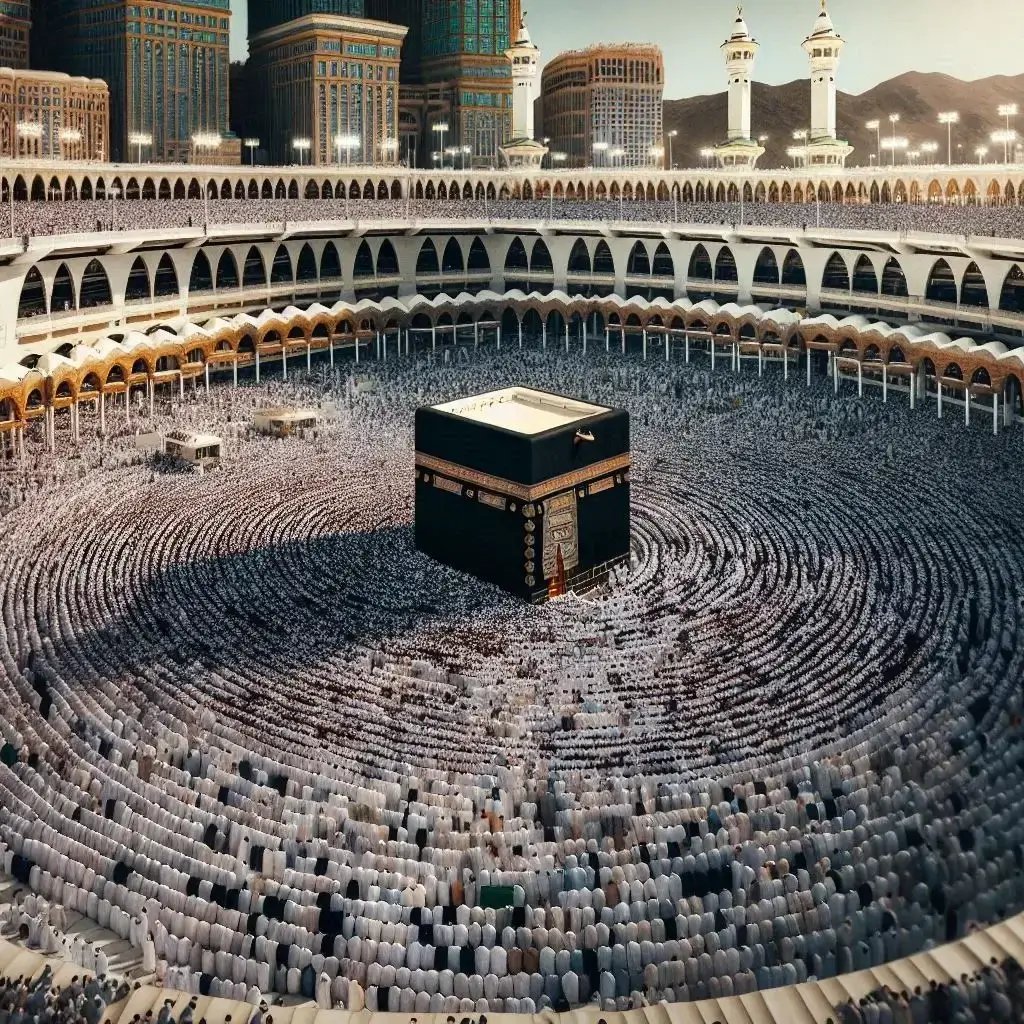
The rituals of Hajj include acts of worship and remembrance that commemorate the actions of Ibrahim (AS) and his family. For instance, the ritual of Tawaf, where pilgrims circumambulate the Kaaba, and the symbolic stoning of the devil, reflect the trials and acts of obedience associated with Ibrahim. The connection between Hajj and Eid ul-Adha reinforces the themes of sacrifice, submission, and faith, making the festival a deeply spiritual time for all Muslims, whether they are performing the pilgrimage or celebrating elsewhere.
The Qurbani (Sacrifice)
The act of Qurbani, or animal sacrifice, is a central ritual of Eid ul-Adha. This practice commemorates Ibrahim’s (AS) willingness to sacrifice his son Ismail, symbolizing obedience and submission to Allah. The sacrificed animal, typically a goat, sheep, cow, or camel, must meet certain criteria to ensure it is healthy and suitable for the ritual.
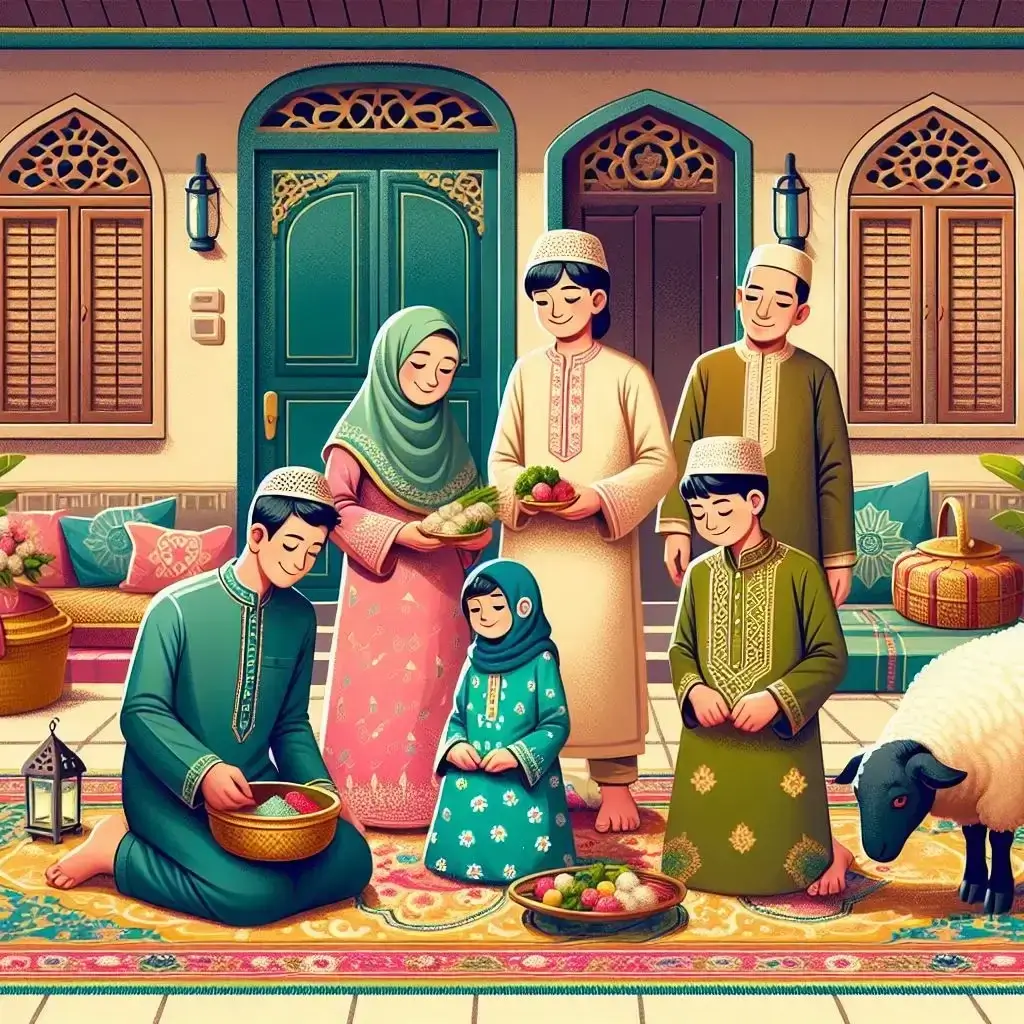
The meat from the sacrificed animal is divided into three parts: one third is given to the poor and needy, one third is shared with relatives and friends, and one third is kept for the family’s own consumption. This distribution emphasizes the values of charity, community, and sharing, making Qurbani a meaningful and communal act of worship.
Eid Prayers and Sermons
Eid ul-Adha begins with a special prayer known as the Salat al-Eid. This prayer is performed in congregation, often in large open areas or mosques, and is accompanied by a sermon (khutbah) that highlights the significance of the festival and the lessons to be learned from Ibrahim’s (AS) story. The prayer and sermon serve as a spiritual foundation for the day’s celebrations, fostering a sense of unity and collective worship among the Muslim community.
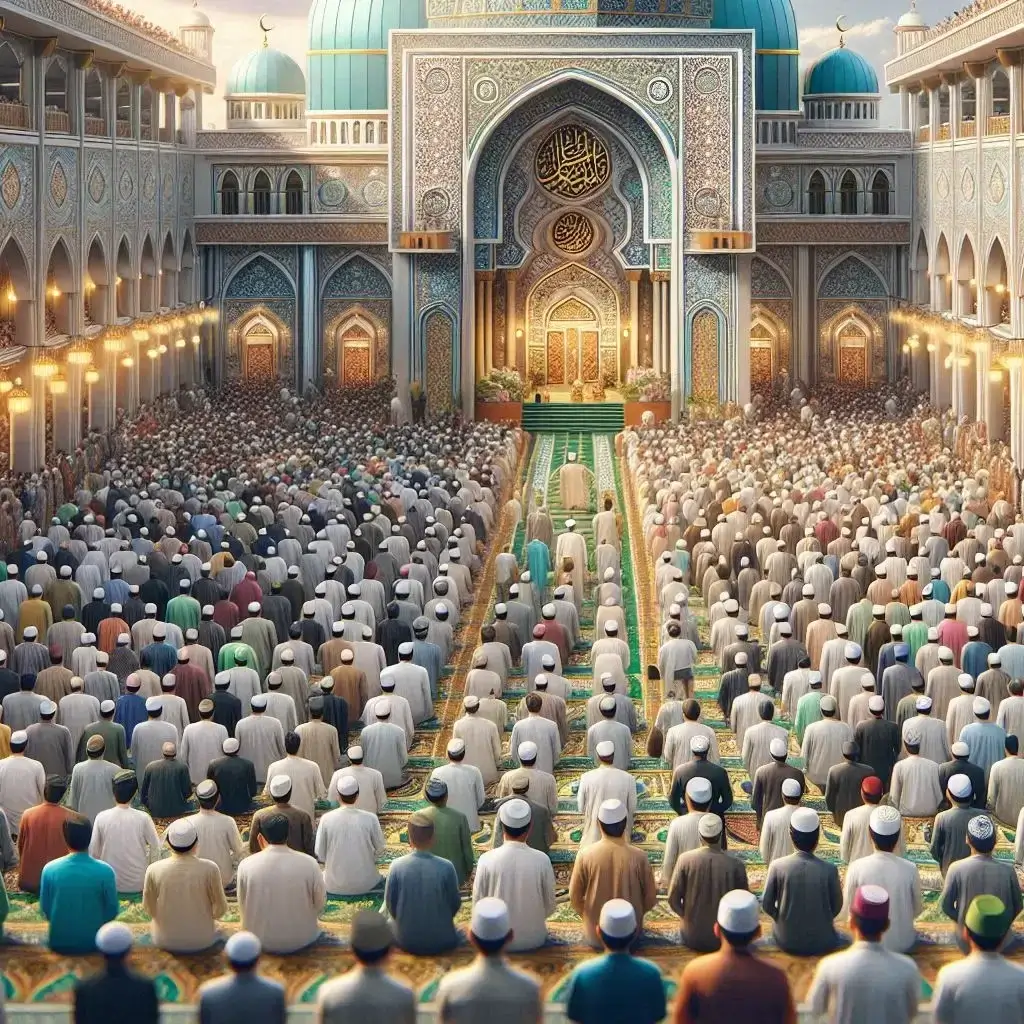
Participating in the Eid prayer is an important aspect of the festival, as it allows Muslims to come together, strengthen their bonds of faith, and reflect on the spiritual messages of Eid ul-Adha. The communal aspect of the prayer reinforces the sense of belonging and shared devotion that is central to the festival.
Festive Meals and Gatherings
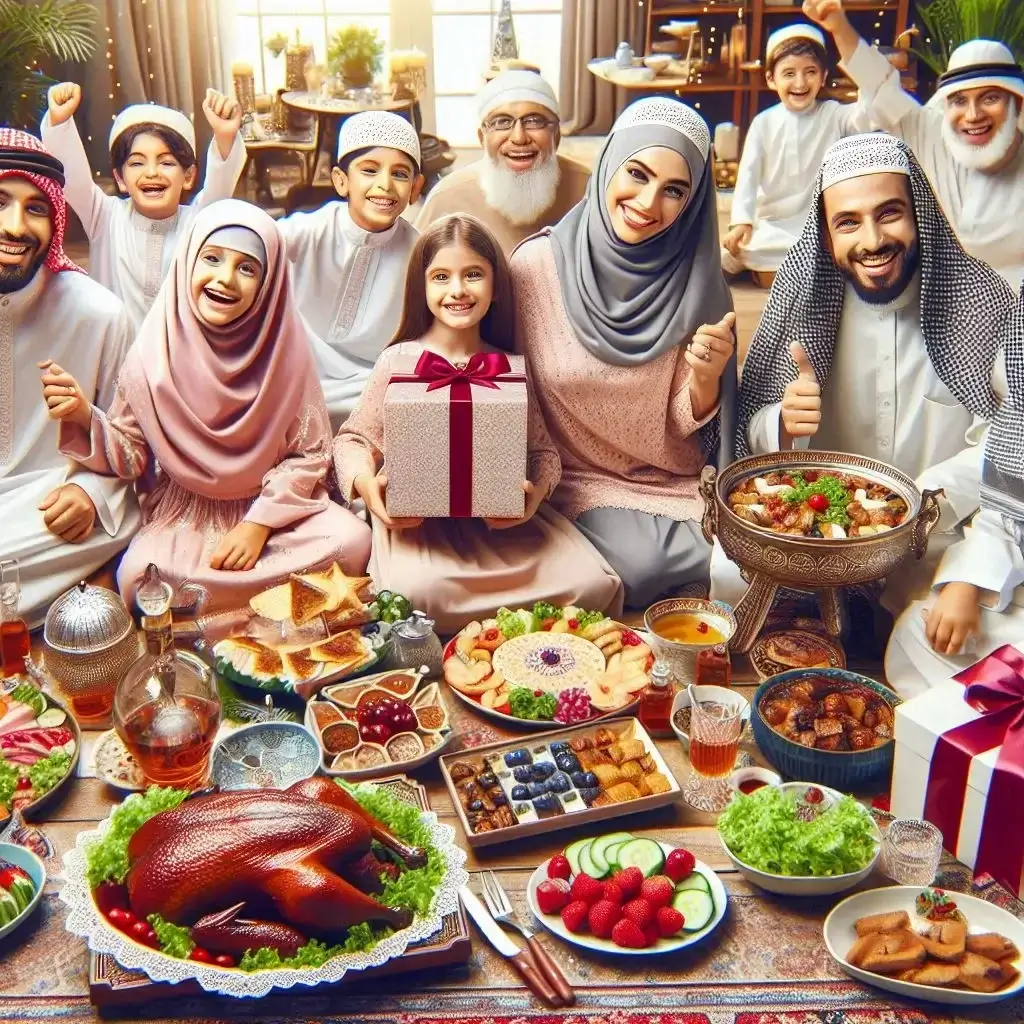
Eid ul-Adha is also a time for joyous celebration, marked by festive meals and gatherings with family and friends. The day is typically spent visiting loved ones, sharing meals, and exchanging gifts. The festive meals often include dishes prepared from the meat of the sacrificed animal, symbolizing the blessings and bounty provided by Allah.
These gatherings and meals are an opportunity for Muslims to strengthen familial and social bonds, celebrate their shared faith, and express gratitude for the blessings they have received. The communal aspect of Eid ul-Adha celebrations underscores the importance of family, friendship, and community in Islam.
Related Article : Spiritual Meaning of Qurbani
Eid ul-Adha Traditions Around the World
Eid ul-Adha is celebrated by Muslims around the world, with each region incorporating its own unique cultural practices and traditions. While the core rituals and significance of the festival remain the same, these regional variations add richness and diversity to the celebration.
Regional Variations in Celebrations
The way Eid ul-Adha is celebrated can vary widely from one region to another. In some countries, the festival is marked by large public celebrations and communal prayers, while in others, it may be a more private and family-oriented affair. These regional differences reflect the diverse cultural contexts in which Islam is practiced, adding unique flavors to the universal themes of the festival.
For example, in South Asia, Eid ul-Adha is often celebrated with elaborate feasts and colorful clothing, while in the Middle East, the emphasis may be more on communal prayers and charitable activities. In African countries, traditional music and dance can be an integral part of the celebrations, highlighting the cultural heritage of the Muslim communities in those regions.
Unique Cultural Practices
In addition to the core rituals, many regions have developed their own unique cultural practices to celebrate Eid ul-Adha. These practices can include traditional foods, music, dances, and other forms of cultural expression that reflect the local customs and heritage.
For instance, in Indonesia, a popular dish called “Rendang” (spicy beef stew) is commonly prepared for Eid ul-Adha. In Turkey, the festival is known as “Kurban Bayramı,” and special emphasis is placed on visiting relatives and sharing meals. In Morocco, the day is marked by preparing “Mechoui” (roast lamb) and gathering for communal feasts.
These cultural practices add a layer of local flavor to the universal themes of Eid ul-Adha, allowing Muslims to celebrate their faith while honoring their cultural traditions.
Common Threads of Faith and Festivity
Despite the regional variations, there are common threads that unite Muslims in their celebration of Eid ul-Adha. The themes of sacrifice, obedience to Allah, charity, and communal harmony are central to the festival, regardless of where it is celebrated. These commonalities reinforce the sense of global Muslim unity and shared faith, creating a bond that transcends cultural and geographical boundaries.
The communal prayers, the act of Qurbani, the emphasis on charity, and the festive gatherings are all expressions of the shared values and beliefs that underpin Eid ul-Adha. These common practices highlight the universal nature of the festival, while also allowing for the rich diversity of cultural expressions within the Muslim community.
The Deeper Meaning and Lessons of Eid ul-Adha
Eid ul-Adha is not just a celebration; it is a time for reflection and spiritual growth. The festival carries deep meanings and lessons that resonate with Muslims on a personal and communal level.
Sacrifice as a Path to Spiritual Growth
The story of Ibrahim (AS) and his willingness to sacrifice his son Ismail (AS) is a powerful reminder of the importance of sacrifice in the spiritual journey. It teaches Muslims that true faith requires not only belief but also the readiness to make personal sacrifices for the sake of Allah. This act of sacrifice is a path to spiritual growth, fostering a deeper connection with Allah and a greater understanding of His will.
Eid ul-Adha encourages Muslims to reflect on their own lives and consider what sacrifices they can make to strengthen their faith and devotion. Whether it is giving up material possessions, dedicating time to worship, or helping those in need, the festival reminds believers that sacrifice is an essential aspect of their spiritual journey.
The Importance of Sharing and Caring for Others
Another key lesson of Eid ul-Adha is the importance of sharing and caring for others. The act of Qurbani, where the meat of the sacrificed animal is distributed to the poor and needy, underscores the values of charity and generosity. This practice teaches Muslims to look beyond their own needs and to consider the well-being of others, fostering a sense of community and mutual support.
The festival encourages believers to engage in acts of charity and kindness, not just during Eid but throughout the year. By sharing their blessings with others, Muslims fulfill their religious duty and strengthen the bonds of brotherhood and sisterhood within the community.
Renewing Our Commitment to Faith and Obedience
Eid ul-Adha is also a time to renew one’s commitment to faith and obedience to Allah. The story of Ibrahim (AS) and the rituals of the festival serve as powerful reminders of the importance of unwavering faith and submission to Allah’s will. The festival provides an opportunity for Muslims to reflect on their spiritual journey, assess their level of devotion, and renew their commitment to following the path of righteousness.
Participating in the rituals of Eid ul-Adha, such as the prayers, the Qurbani, and acts of charity, helps believers strengthen their faith and reaffirm their dedication to living according to Islamic principles. This renewal of faith and commitment is a central aspect of the spiritual significance of Eid ul-Adha.
Eid ul-Adha in the Modern World
In the modern world, Eid ul-Adha faces both challenges and opportunities. The festival continues to be a vital part of Muslim life, but it must also adapt to the changing social and cultural contexts in which it is celebrated.
Challenges and Opportunities for Muslims Today
One of the main challenges for Muslims today is maintaining the traditional practices and values of Eid ul-Adha in a rapidly changing world. Urbanization, globalization, and technological advancements have transformed the way people live and interact, affecting how religious traditions are observed.
However, these changes also present opportunities for Muslims to find new and innovative ways to celebrate Eid ul-Adha while staying true to its core principles. For instance, technology can be used to connect with family and friends who are far away, share the message of Eid ul-Adha with a wider audience, and facilitate acts of charity and community support.
Adapting Traditions to a Changing World
Adapting the traditions of Eid ul-Adha to a changing world involves finding a balance between preserving the essence of the festival and embracing new ways of celebration. This might include incorporating modern conveniences into traditional practices, such as using online platforms for Qurbani donations or organizing virtual Eid gatherings.
Muslims can also use the opportunities provided by modern technology and social media to spread the message of Eid ul-Adha, raise awareness about its significance, and promote acts of charity and kindness. By finding creative ways to adapt the traditions to contemporary contexts, Muslims can ensure that Eid ul-Adha remains a meaningful and relevant part of their lives.
The Importance of Preserving the Spirit of Eid
While it is important to adapt to changing times, it is equally crucial to preserve the spirit of Eid ul-Adha. The values of sacrifice, obedience to Allah, charity, and community are timeless and must be upheld, regardless of how the festival is celebrated.
Muslims must strive to keep the essence of Eid ul-Adha alive by participating in the core rituals, reflecting on the spiritual lessons of the festival, and engaging in acts of charity and kindness. By maintaining the spirit of Eid ul-Adha, believers can ensure that the festival continues to be a source of spiritual growth, communal harmony, and social responsibility.
How to Celebrate Eid ul-Adha
Celebrating Eid ul-Adha involves a combination of religious rituals, family gatherings, and acts of charity. Here are some ways to prepare for and celebrate the festival:
Preparing for the Festival
Preparation for Eid ul-Adha begins with spiritual readiness. Muslims are encouraged to engage in additional prayers, recite the Quran, and seek forgiveness for their sins. Preparing for the festival also involves planning the Qurbani, ensuring that the sacrificial animal meets the required criteria, and organizing the distribution of the meat.
In addition to spiritual and logistical preparations, many Muslims also take the time to clean and decorate their homes, purchase new clothes, and prepare festive meals. These preparations help create a joyful and festive atmosphere, enhancing the sense of celebration and togetherness.
Celebrating with Family and Friends
Eid ul-Adha is a time for family and community gatherings. After the Eid prayer, Muslims typically visit the homes of relatives and friends, share meals, and exchange gifts. These gatherings are an opportunity to strengthen familial and social bonds, celebrate shared faith, and express gratitude for the blessings received.
Festive meals are an integral part of the celebration, often featuring dishes prepared from the meat of the sacrificed animal. These meals are a time to enjoy good food, share stories, and create lasting memories with loved ones.
Giving to Charity and Supporting Those in Need
One of the most important aspects of Eid ul-Adha is giving to charity and supporting those in need. The distribution of the Qurbani meat to the poor and needy is a key part of the festival, emphasizing the values of charity and generosity. In addition to the Qurbani, Muslims are encouraged to make additional charitable donations, support community projects, and engage in acts of kindness.
By giving to charity and supporting those in need, Muslims fulfill their religious duty and embody the spirit of Eid ul-Adha. These acts of generosity help create a more just and compassionate society, reflecting the core values of Islam.
Eid ul-Adha is a profound and significant festival that celebrates the themes of sacrifice, obedience, charity, and community. It commemorates the willingness of Prophet Ibrahim (AS) to sacrifice his son in obedience to Allah, serving as a powerful reminder of the importance of faith and submission. Through rituals such as the Qurbani, communal prayers, and acts of charity, Muslims reaffirm their commitment to their faith and strengthen their bonds with their community.
In the modern world, Eid ul-Adha faces both challenges and opportunities. While adapting to changing times, it is crucial to preserve the spirit of the festival and uphold its core values. By engaging in meaningful acts of worship, celebration, and charity, Muslims can ensure that Eid ul-Adha remains a source of spiritual growth, communal harmony, and social responsibility for generations to come.

